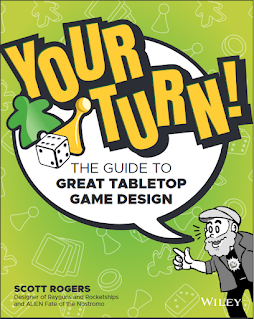YOU CAN DESIGN A GAME, BUT CAN YOU DO THE PAPERWORK?

A Japanese game director once visited the studio where I worked to impart his wisdom to our team about his philosophy of game design, which mainly had to do with how much money his latest game had made. As he was leaving, he asked our team a cryptic question: “I believe making games is like fishing” he said. “When I return, you will tell me why this is so.” If he had been wearing a cape, I’m sure he would have swooshed it mysteriously as he left.
I spent a lot of time thinking about just exactly how making games was like fishing. In the end, I decided that making games is nothing like fishing. Fishing is quiet and slow and involves waiting for something to happen that may never happen. I also decided that this game director was full of crap. So I developed my own analogy.

Making games is like making chili (bear with me — it’ll make sense). Like making chili, you first need a recipe and that recipe is the game’s documentation. Having the right recipe is important. You are not making soup or stew. You want to make sure your documentation not only has what is in it, but how it can be made: just like a recipe. Be sure to follow the recipe, but be mindful that it will have to change, especially if something doesn’t go right. And, just like making chili, remember that you can season to taste. Some parts of the game will be “meatier” than others and you will want to adjust your game to make those parts more pronounced.
Next step is to assemble the ingredients. Just as a chili needs ingredients, a game’s design needs people and tools to make the game. You’ll also need the right equipment to make your game, just like you’ll need spoons and pots and pans and a stove to make your chili. However, you might not have exactly what you need on hand. Sometimes you will have the team and resources you want, sometimes you have to improvise with what is available. That’s OK; I hear cowboys made some pretty good chili with nothing more than a campfire and a tin can.
Add these ingredients together. The beauty of chili is that it usually works no matter how you prepare the ingredients. You can carefully cut and chop everything or just throw it together in a big pot. Some game productions are very methodical and well organized. Others are a mad dash to get all of the elements into the game as soon as possible. Just make sure you follow the recipe so you don’t forget anything. Prepare the ingredients in the right order. Always brown the meat before you add it to the pot. (I learned that one that hard way.)
In chili, everything is brought to a boil and then left to simmer. Crunch Time reminds me of boiling: a frantic burst of energy and effort to get everything in and running. However, if you boil for too long, you can ruin the chili, burn the pot and catch the stove on fire. Games and studios have been destroyed by too much crunch time, so be responsible. Game polishing and bug squashing reminds me of chili simmering. Chili isn’t ready the moment you finish assembling it. You need to take the time to make it just right. Games, just like Chili, need time to be iterated on, improved and seasoned. Bugs, code, art and design problems with the game, need to be found and fixed. That takes time. Allow for that time - just like you need to allow for cooking time for chili. Sometimes it’s good to let the team play with a part of the game to find out what works and what doesn’t. I find that chili always tastes better the day after you have made it.
Your chili may need something added to it at the last minute to make it work. Unless you’ve royally screwed it up, chili can usually be salvaged. I’ve seen troubled games get turned around in the eleventh hour. However, I don’t recommend making games this way. It can lead to stomach upset. Chili can also deceive. It may look horrible, but still taste delicious. Some games may not be perfect or even pretty, but if they have good gameplay they can still entertain. Good games and good chili satisfy soul as well as the stomach. (Or the head - if you think with your stomach.)
You see? Making games is exactly like making chili.










2 comments:
I believe a good analogy is like a tagline to a game, short and to the point. The author's analogy wouldn't have made any sense either if he didn't explain it.
My take on why making games is like fishing is that you have to put something out there and see what bites.
Hi Gone Fishing,
While I appreciate you trying to make sense of the fishing analogy, I still maintain that "putting something out there and see what bites" is too loosey-goosey for my taste. I would rather you put out something that YOU like and find your audience... which is still nothing like fishing. :)
Post a Comment